Last month, when Viswanathan Anand found himself across the board from Gukesh D in a chess match heaving with subtext, he couldn’t help but feel a perceptible change in the teenager sitting across him.
Tilak Varma sizzles but India combust in the final lap in first T20 against West Indies
Over the last few years, as Gukesh has risen meteorically in a sport of teenage prodigies, Anand, the nation’s first grandmaster, has become a mentor for the 17-year-old via the Westbridge Anand Chess Academy. But sitting across the board from Gukesh for a Rapid encounter at the SuperUnited Rapid and Blitz Croatia chess tournament, their pieces staring down each other as they primed for combat, Anand sensed something was different.
“I haven’t sat across from him very often. But in Zagreb when we played each other, I got to see a slightly newer side of him. He looked very cold. Very distant. I realised he was just trying to focus before the game. It’s possible he’s done this before (against other opponents), but it stood out for me because it was the first time I sat down and faced him in a competition,” Anand told The Indian Express from Baku, where the FIDE World Cup started on Sunday.
Gianluigi Buffon announces retirement from football: ‘You gave me everything. I gave you everything’
The significance of that Rapid game was lost on no one, particularly after Gukesh, who has been heralded as a worthy successor to the five-time world champion, emerged triumphant. At that point, Gukesh was ranked 15th in the world and bearing down on World No. 9 Anand, who has held the distinction of being India’s top-ranked chess player in FIDE’s published classical charts since July 1986 (only Pentala Harikrishna briefly went ahead of Anand in live ratings in 2016, but no Indian chess player has managed to do it in the published ratings).
On Thursday, when Gukesh defeated Mistradin Iskandrov 2-0 at the FIDE World Cup in Baku, it ensured that he will become the first Indian to surpass Anand when FIDE publish their next list of rankings in the days to come.
“Anand sir has been my idol since the time I started playing chess. He’s one of the prominent reasons why I started playing the sport actually. Overtaking him would be something memorable for me. But no matter how many Indians get to the next level, get to the Candidates or maybe even enter the World Championships and become the World Champion, Anand sir will always be the special one.
“He started all this. Without him, this success (for Indian chess players) would not be possible. So no matter what, he will always be the greatest Indian chess player. Overtaking him would be nice but I have more important goals to look forward to,” Gukesh told The Indian Express in June as he was readying himself for the Global Chess League.
By the end of the World Cup in Baku, Gukesh could accomplish two of those important goals he speaks of — breaking into the top 10 and qualifying for the Candidates tournament. But the moment he goes ahead of Anand in the rankings will be the biggest talking point for anyone who follows the sport, particularly since 58 GMs that separate Anand and Gukesh have been unable to do it before the latter came along.
Deodhar Trophy: Red-hot South Zone hold edge over competitive East Zone in final
The teenager rummaged through his memories and pulled out two distinct memories of the man he calls his idol. In the first one, Gukesh is a boy of eight or nine years of age and Anand is at his school for a felicitation function. It’s the first opportunity for Gukesh to see the chess legend up close.
But it’s the second moment, many years later, that has a lasting impact on him. At the Chess Olympiad in Chennai last year, Gukesh (then ranked World No 20 and aged 16) went on a rampaging run, scything through eight opponents including Fabiano Caruana, before he blundered from a winning position to lose to Uzbekistan’s Nodirbek Abdusattorov in the 10th round. Visuals from the match showed a disconsolate Gukesh as he realised that his defeat meant that the India 2 team — composed of Praggnanandhaa R, Nihal Sarin, Raunak Sadhwani and Adhiban B besides Gukesh — were unlikely to win gold.
“Gukesh had given a sensational performance (at the Olympiad). Despite losing to Nodirbek, it was one of the most sensational performances in Olympiad history. He had a winning position the whole game. On top of that had he won, he would have practically clinched first place for the India 2 team. It’s hard to describe how much pain such a game can cause you. He first didn’t manage to make progress with his advantage. Then he forgot to stop: he could have taken a draw at almost any moment and could have still clinched the tie for India (as India were leading in that tie thanks to Pragg),” said Anand.
Deodhar Trophy: Red-hot South Zone hold edge over competitive East Zone in final
Anand knew it was the sort of defeat that could leave a scar if left unattended. So he reached out.
“I was upset (after the Nodirbek game) and he (Anand) said, ‘if you want to talk, let’s do it’. We met after the game and I think we chatted for one-and-a-half or maybe two hours. That helped me to rewire and focus on my next game which was also quite important. That’s something I’ll remember for a long time,” Gukesh said.
Anand’s memory of that day is slightly different.
“I was sure he would feel depressed. I’ve had games like these where there’s a lot riding on the outcome and I have blown it. I know what it does to you. So I thought let me go to him and try and cheer him up. I at least wanted to keep talking to him so he doesn’t keep thinking about the defeat,” recalled Anand. “I went to talk to him and after a few minutes he said, ‘I’m fine, sir.’”
Anand tried to tell the teenager that he was in denial and offered to show him some games in a bid to cheer him up. But Gukesh was vehement that he was fine.
“Then I decided I cannot insist that he’s upset. So I let it go. The conversation didn’t last for two hours. We spoke for 10 or 15 minutes maybe,” said the 53-year-old.
The duo ended up heading to the lobby and playing table tennis. Regardless of how long that conversation lasted, it was a moment of bonding between a legend of the sport and a man aspiring to get there. It’s a rare equation unlike the tension that exists between other great Indian athletes who are constantly in fear of their own greatness eroding by the emergence of a newer lot and consequently feel threatened by up-and-comers.
“I couldn’t even have imagined that moment (spending time talking with Anand) as a kid,” said Gukesh. “All of it was amazing. He was, and always will, be my hero.”
.








